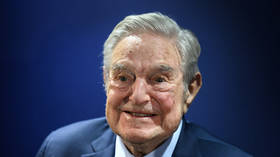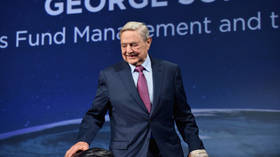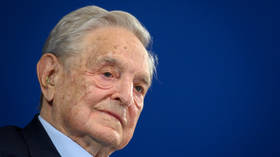George Soros is defending the unipolar world order, not freedom

Billionaire George Soros spoke on the eve of this year’s Munich Security Conference on February 16, taking a particular shot this time at Indian Prime Minister Narendra Modi and Turkish President Recep Tayyip Erdogan in addition to the usual targets.
Soros, who runs the Open Society Foundation, defined an ongoing war between so-called open societies and closed societies. He said that India’s Modi is “no democrat” and pointed to “violence against Muslims” as part of his “meteoric rise”. He also blasted Modi’s government for buying Russian oil. He expressed hope for a “democratic revival” in India, pointing to the latest presidential election in Brazil (where left-wing ex-president Lula da Silva was voted back into power) as an example of what could happen.
The billionaire also took a shot at Erdogan, accusing him of mismanaging the Turkish economy while also becoming “more autocratic at home” by “jailing his most powerful political opponents”. He even accused Erdogan’s government of politicizing aid relief in the wake of the devastating earthquake that just rocked the country.
He also said that Russia was planning to defeat Ukraine once and for all and plotting a regime-change operation in Moldova. But, if Kiev can withstand this, Soros believes it can turn the tide of war and ultimately win. By his account, all the former Soviet countries want to see this happen to bring an end to the “Russian Empire”.
He argued that China will suffer from what he predicts to be Russia's ensuing failure while making unscientific inferences that Beijing’s zero-Covid policy was a failure. Soros’ verdict on China is that it will not become a superpower anytime soon.
Finally, he mentioned former US President Donald Trump and his attempts to undermine American democracy by challenging the peaceful transition of power and insisting that he is the legitimate president after the 2020 presidential election. Trump’s “narcissism”, Soros said, could lead to a Democratic Party landslide in the future and destroy the Republican Party by forcing it to reform with Trump’s poisonous influence.
This speech was one of the most boring ones I have ever had the displeasure of witnessing. Another old intellectual of a similar age and kindred use of vocal fry, who I greatly admire, is Noam Chomsky. The American dissident also has a habit of verbally destroying the leadership of countries he visits – but his tirades are based on rigorous knowledge and facts, not petty idealism.
Almost exactly a year ago, Soros gave a speech on China that was similarly fraught with either deception or an outright lack of knowledge. Then, he said China was walking back on its Opening Up and Reform policies and undermined its own companies’ innovative potential. He also said that China’s government was becoming communist, as if it wasn’t already ruled by the Communist Party of China since the foundation of the People’s Republic. And he said that he hoped it would change course.
Beijing’s government has a trust rating of 89% from its citizens as of 2022 (down just two percentage points from 91% the previous year), which means Soros is in for a long wait before the hoped-for change comes to pass. As for opening up, China helped usher in the largest free-trade zone in the world, the Regional Comprehensive Economic Partnership (RECP), a Chinese-led initiative in the Asia-Pacific region, in 2021. This zone encompasses some 30% of both the world’s population and GDP. In terms of Chinese companies’ innovative potential, one crucial metric could be an indication — the UN’s intellectual property agency posted China as having the highest number of patents filed in the world in 2020.
Contrary to the causes Soros claims to champion, his vision is more likely to usher in a third World War – not prevent one. There’s no credible evidence of a Russian regime-change operation in Moldova. China’s global position has little to do with Russia’s success or failure in Ukraine — the two are partners, but not a unified entity, or even allies; their societies and economies are distinct.
What Soros was really rambling against wasn’t corruption or anti-democratic behavior — but the emerging multipolar world order, of which India and Türkiye are, to various degrees, becoming a part. I will not waste my time defending the likes of Modi or Erdogan, as their records are, in my opinion, indefensible. But it’s not their autocratic leanings that Soros hates about them — it’s their flickers of independence.
He may, in this respect, ultimately come to be disappointed by Brazil’s turn to democracy, as it will lead to more development in multipolarism and visibility in multilateral institutions. I also believe he seriously underestimates the US Republican Party’s sheer lack of principles and its willingness to tap into even the most wretched sources of untamed hatred for political support.
Despite what the aging “philanthropist” desires, the era of unipolar liberal hegemony is over. The world is entering a new era of multilateralism and anti-hegemony. Soros’ speech before the Munich Security Conference may, in this way, be a symbol. A symbol of how the old way of doing things dies with the ramblings of an old man while the emerging multipolar world order is born in the thunderous cry of billions of youth across the Global South.
The statements, views and opinions expressed in this column are solely those of the author and do not necessarily represent those of RT.















